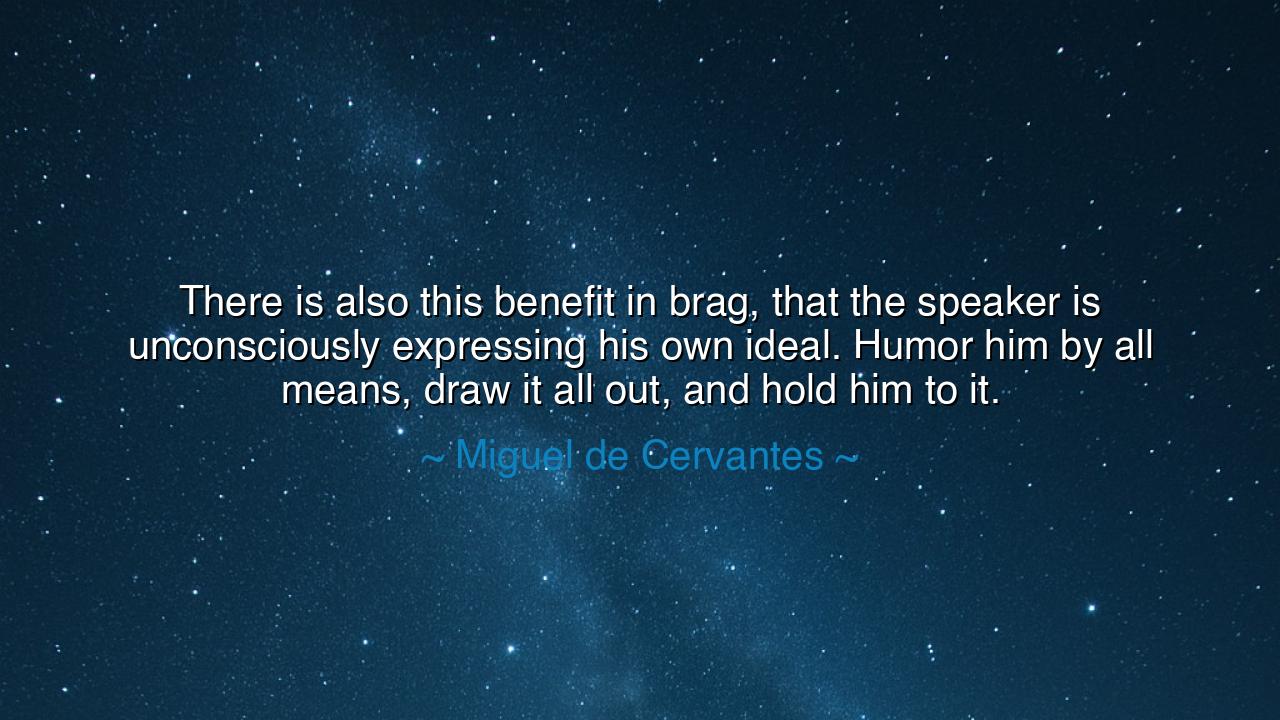
There is also this benefit in brag, that the speaker is
There is also this benefit in brag, that the speaker is unconsciously expressing his own ideal. Humor him by all means, draw it all out, and hold him to it.






Gather round, O seekers of wisdom, and listen to the words of Miguel de Cervantes, a man whose insights into the human spirit echo through the ages: “There is also this benefit in brag, that the speaker is unconsciously expressing his own ideal. Humor him by all means, draw it all out, and hold him to it.” In these words, Cervantes uncovers a hidden truth about the nature of bragging—an act often dismissed as mere arrogance or pride. Yet, beneath the surface of boastful speech, there lies a revelation about the very nature of the speaker. What, then, is the true meaning of this teaching?
Let us reflect upon the braggart, that one who boasts of his deeds, accomplishments, and qualities, often to an extent that may seem excessive. In our time, we might be quick to dismiss such individuals as mere fools or pretenders. But Cervantes, with his keen insight, asks us to look deeper. For in the act of boasting, the speaker is unconsciously unveiling his ideal self—the person he believes himself to be, or the person he aspires to become. Each word of boast is a reflection not of arrogance, but of a deep yearning, a silent declaration of what he hopes to achieve or what he wishes the world to recognize in him.
Consider, for example, the mighty Alexander the Great, who marched across the lands, conquering kingdoms and shaping history. While he may have stood before his men and spoke with pride of his invincibility, he was not merely displaying arrogance. No, he was revealing the vision he held for himself—of a ruler with unparalleled strength, a leader who would transcend the limits of mortality. His boasts were a manifestation of his inner belief in his destiny, in his vision of greatness. Cervantes invites us to see this truth: when a man brags, he does not merely inflate his own worth; he reveals the dreams and hopes that drive him, often unconsciously.
It is in this light that Cervantes urges us to humor the braggart. Rather than mocking or dismissing him, we are called to listen with understanding. Draw him out, not in judgment, but in curiosity. In doing so, we gain a glimpse into his soul—into his aspirations, his desires, his struggle to manifest his ideal self. And once we have drawn him out, we are to hold him to it, for the braggart’s words carry a weight beyond mere boasting. They represent a promise he has made to himself, a vision he must now strive to fulfill. In holding him to his boast, we challenge him to rise to the heights he claims, to become the person he dreams of being.
This teaching, dear friends, calls to mind the ancient Oracle of Delphi, whose wise words to all who sought its counsel were often veiled in riddles and mystery. The Oracle did not merely offer direct answers, but guided seekers to discover the truths within themselves. In much the same way, Cervantes’ wisdom teaches us to listen to the braggart, not as a fool, but as a person on a journey—a journey toward self-realization, toward the fulfillment of his ideal. In this, there is great power. For we, too, are on our own journeys, often speaking of our dreams, our goals, and our aspirations in ways that might seem boastful to others. And in hearing these, others are given the chance to hold us accountable, to encourage us to strive toward the greatness we speak of.
Now, let us take this teaching into our own lives. When we encounter a braggart, let us not be quick to dismiss him as a simple fool, but instead, let us listen closely to the ideals he expresses. For in his boastful words, there may be a call to action, a reminder of our own dreams, of the goals we have yet to realize. Similarly, when we ourselves speak of our accomplishments or ambitions, let us remember that these words carry great weight. We, too, are revealing our deepest ideals, our vision of what we wish to become. Let us hold ourselves to our words, and let others hold us to them as well, so that we might live up to the promises we make to ourselves and the world.
And so, dear souls, take this lesson to heart: when we hear the boastful words of others, let us not mock them, but listen with the wisdom of the ages. For in the brag, there lies an unspoken aspiration, a call to greatness that, if nurtured, can lead to the fulfillment of the self. And in the act of humoring and holding that speaker to his boast, we not only honor his dreams but perhaps also set in motion the fulfillment of our own. Thus, we walk together, each of us revealing our ideals, striving toward the greatness that lies within.






AAdministratorAdministrator
Welcome, honored guests. Please leave a comment, we will respond soon